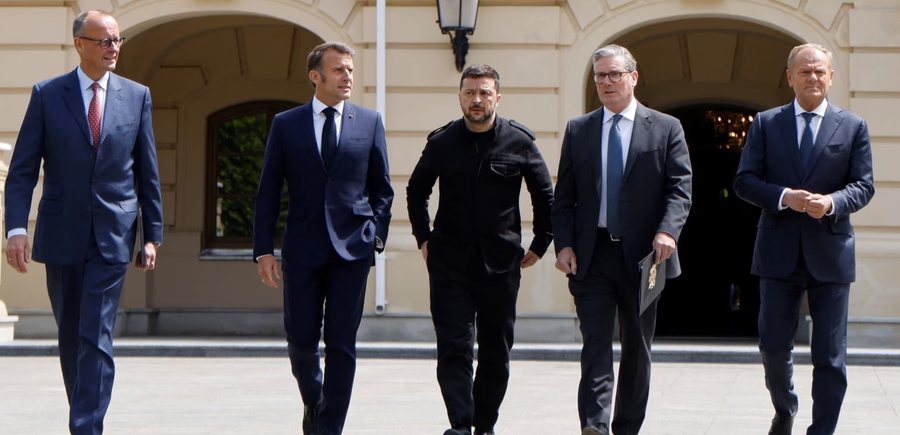
With the ink still wet on the European Union's newly adopted 17th package of sanctions against Russia, European leaders are already preparing the next step, which they describe as "massive."
But some analysts warn that, in many ways, the EU has already played its strongest cards and is left with few options – especially at a time when Washington is reluctant to join it, as it is seeking peace talks between Kiev and Moscow, A2 reports.
"The cards we have left require, to a large extent, the involvement of the United States," said Benjamin Hilgenstock, a senior economist at the Kiev-based KSE Institute, in an interview with Radio Free Europe (RFE/RL).
"Specifically, this is related to the withdrawal of Russian oil and gas from world markets in large quantities," he added, stressing that countries like India, China and Turkey will not stop buying Russian fossil fuels without the pressure of secondary US sanctions.
On May 10, European leaders warned Russia of “massive” sanctions if it does not agree to a 30-day ceasefire proposed by the United States. They said the request was coordinated with US President Donald Trump.
This warning was intended to be presented as a turning point, but transatlantic harmony quickly broke down.
Russian President Vladimir Putin did not pledge a ceasefire during a phone call with Trump on May 19, but the latter welcomed the conversation and gave no sign of new US sanctions, saying that imposing them could damage the talks and worsen the situation.
To clarify: the threat of "massive" sanctions had nothing to do with the EU's 17th package, which was announced on May 20, as this package had been in preparation for some time.
An empty threat?
Now, European leaders must offer something big, without US support, or they risk looking like they have made an empty threat.
Will they be able to do it?
Lithuanian Foreign Minister Kestutis Budrys believes so. He told Radio Free Europe that the EU could redouble efforts to stop Russian energy exports.
"We must stop the main source of income for Russia's budget and its war machine. These are exports of gas, oil, and liquefied natural gas. We must stop them," he said.
But in practice, countries like Spain, the Netherlands and Belgium are currently importing more liquefied natural gas than they did a year ago. Budrys argued that there are plenty of alternatives on the global market.
"There are voices saying, 'they're too expensive and we can't afford them.' Look, we [Lithuania] have already done this," he added.
But the price arguments illustrate why the EU has been reluctant to impose sanctions that harm it itself – and this could happen again in the future.
Sanctions will only be "massive when we are willing to go beyond what we are comfortable with," said Tom Keatinge, of the Royal United Services Institute (RUSI) in London, in a conversation with REL.
"By this I mean only when we are willing to accept negative consequences for our economies," he added.
The blow to energy exports
Hilgenstock distinguishes between countries that use Russian liquefied gas for economic reasons, and those, such as Hungary and Slovakia, that oppose the ban due to close political relations with Moscow.
Even if economic objections are overcome, political considerations may delay or complicate the reinforcement of sanctions in this area.
European leaders have suggested that the next package will include the energy sector – but that is a broad term. Some have also mentioned financial measures.
"It's quite unclear what exactly they're talking about," said Hilgenstock, who is also a fellow at the German Council on Foreign Relations.
"Are they overestimating their capabilities? I think so," he added.
European Commission President Ursula von der Leyen gave an indication of what could come on May 16.
"It will include listing more ships from the Russian dark fleet," she said, referring to ships without clear ownership that are used to evade restrictions on Russian oil and petroleum products.
The 17th package of sanctions and the British measures announced the same day added dozens more ships, following the pattern of previous packages. Further additions of ships will seem like a routine step, not something new or shocking.
"Big words, but no actions"
Von der Leyen also mentioned lowering the price ceiling for Russian oil – another punitive measure implemented after the invasion of Ukraine in 2022. But this too requires US agreement for implementation on a global scale.
Three years of sanctions have significantly affected the Russian economy, but have not stopped Moscow's aggression.
However, by announcing the latest measures, European politicians showed determination.
British Foreign Secretary David Lammy called Putin a "warmonger" and urged him to accept the 30-day ceasefire, adding that "delays in peace efforts will only strengthen our determination to help Ukraine defend itself and to use sanctions against Putin's war machine."
EU Foreign Policy Chief Kaja Kallas wrote on social media that "more sanctions against Russia are being prepared."
Keatinge warns that if the EU fails to deliver on its promise of sanctions with real impact, it risks undermining its credibility.
"This gives [Russian Foreign Minister Sergei] Lavrov and others enough material to say that 'Europeans only talk, but do not act.'"
Hilgenstock shares the same concern.
"We are seeing the response – or rather the lack thereof – from Vladimir Putin to this ultimatum," he says, referring to the May 10 declaration of "massive" sanctions.
"This makes it clear what the Russian side thinks."/ REL
(A2 Televizion)











